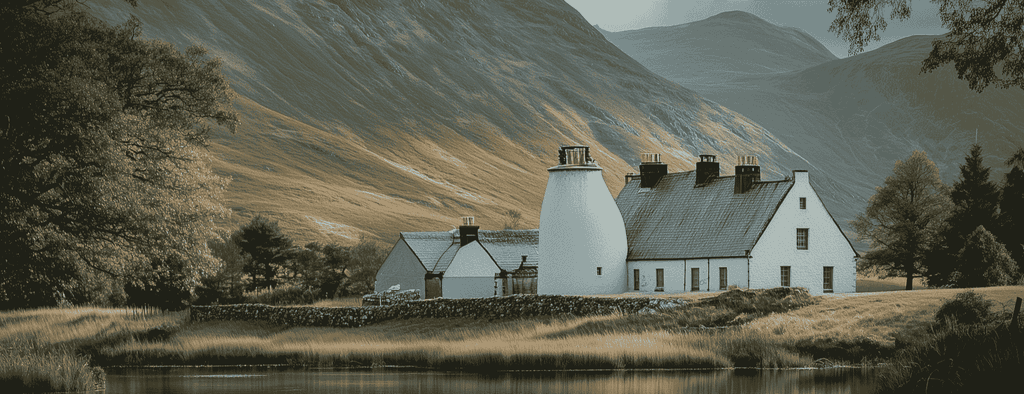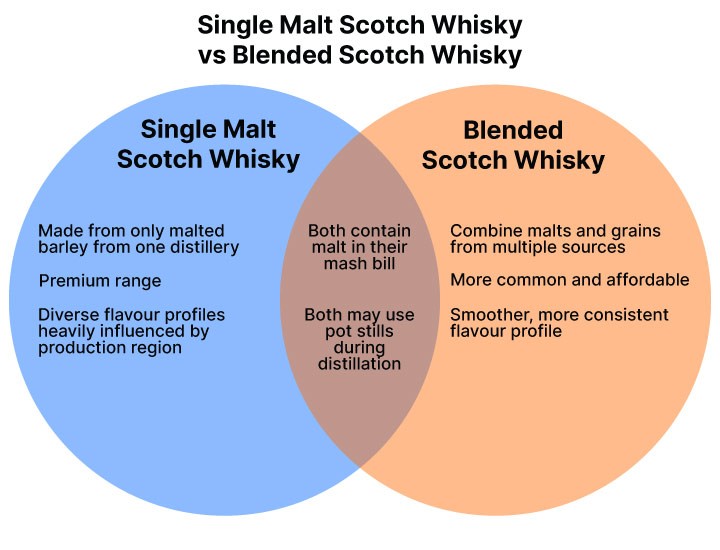Key Takeaways
Production: Single malts are made from malted barley at one distillery; blended whiskies combine malts and grains from multiple sources.
Flavour: Single malts offer diverse regional tastes; blended whiskies provide a smoother, more consistent profile.
Market Position: Single malts are premium and diverse; blends are more common and affordable.
Preference: Choice depends on taste – single malts for depth, blends for smoothness and cocktail suitability.
Single Malt Scotch Whisky and Blended Scotch Whisky comparison
What is Scotch Single Malt Whisky?
Scotch Single Malt Whisky is a premium spirit synonymous with Scottish tradition. It’s produced exclusively in Scotland, using malted barley as the sole grain ingredient. This type of whisky is renowned for showcasing the distinct flavours of its region of origin. Scotch single malt whisky may be made in small batches or as part of large-scale production depending on the distillery and its approach.
Characteristics of Scotch Single Malt Whisky
Grain Ingredient: Solely made from malted barley.
Distillation: Crafted at a single distillery using pot stills.
Region Influence: Flavours vary significantly by region.
Aging Process: Minimum of three years in oak barrels.
Flavour Profile: Ranges from smoky and peaty to light and floral.
ABV: Typically bottled at no less than 40%.
What is Blended Scotch Whisky?
Blended Scotch Whisky is a harmonious combination of malt and grain whiskies. It’s the most common type of Scotch on the market, known for its balanced flavour and smoother profile compared to single malts.
Characteristics of Blended Scotch Whisky
Mash Bill: Combination of malt and grain whisky.
Blending Process: Created by Master Blenders for consistency.
Flavour Consistency: Maintains uniformity across batches.
Flavour Profile: Generally smoother with a balanced taste.
Market Presence: Dominates the Scotch market.
Affordability: Often more accessible price-wise.
Comparing Scotch Single Malt and Blended Whisky
Origin
Mash Bill
Distillation
Flavor Profile
Aging
Market Position
Scotch Single Malt Whisky
Single distillery in Scotland
100% malted barley, grain flavor emphasis
Double distilled in pot stills; defines character
Region-based; peaty to fruity. Complex and distinctive
3+ years in oak barrels; used casks for complexity
Premium; specific flavor and production
Blended Scotch Whisky
Multiple distilleries across Scotland
Malt/barley, corn/wheat; malt and grain whisky mix
Pot (malt) and column (grain) stills; balanced characters
Harmonious, smooth; ranges from robust to delicate
Varied aging; consistent profile. Various casks for nuance
Common, accessible; consistent flavor. Wide appeal
Sipping Preferences: Single Malt vs Blended Whisky
The enjoyment of Scotch whisky, whether single malt or blended, is deeply personal and varies widely among enthusiasts. Single malt Scotch, with its distinct and often intense flavours, is typically favored by those who appreciate depth and complexity in their spirits. The regional characteristics of single malts, from the peaty and smoky flavours of Islay to the light, fruity notes of Speyside, offer a wide range of tasting experiences. Single malts are often preferred neat or with a drop of water to open up the flavours.
Blended whisky, on the other hand, is known for its smoothness and balance, making it an excellent choice for those new to Scotch or who prefer a milder flavour profile. Its consistency and approachability also make blended Scotch a popular choice for cocktails. For many, blended whiskies provide an ideal introduction to the world of Scotch, offering a gateway to the more intense flavours of single malts.
Final thoughts on Scotch single malt and blended whisky
Both single malt and blended whiskies contribute to the rich tapestry of Scotch, each with its own story and appeal. Whether a connoisseur or a casual drinker, the journey through the realms of single malts and blended whiskey is one of discovery and appreciation, offering diverse experiences to suit every palate and occasion.
Frequently asked questions about the difference between Scotch single malt vs blended whisky
Share on social media:









